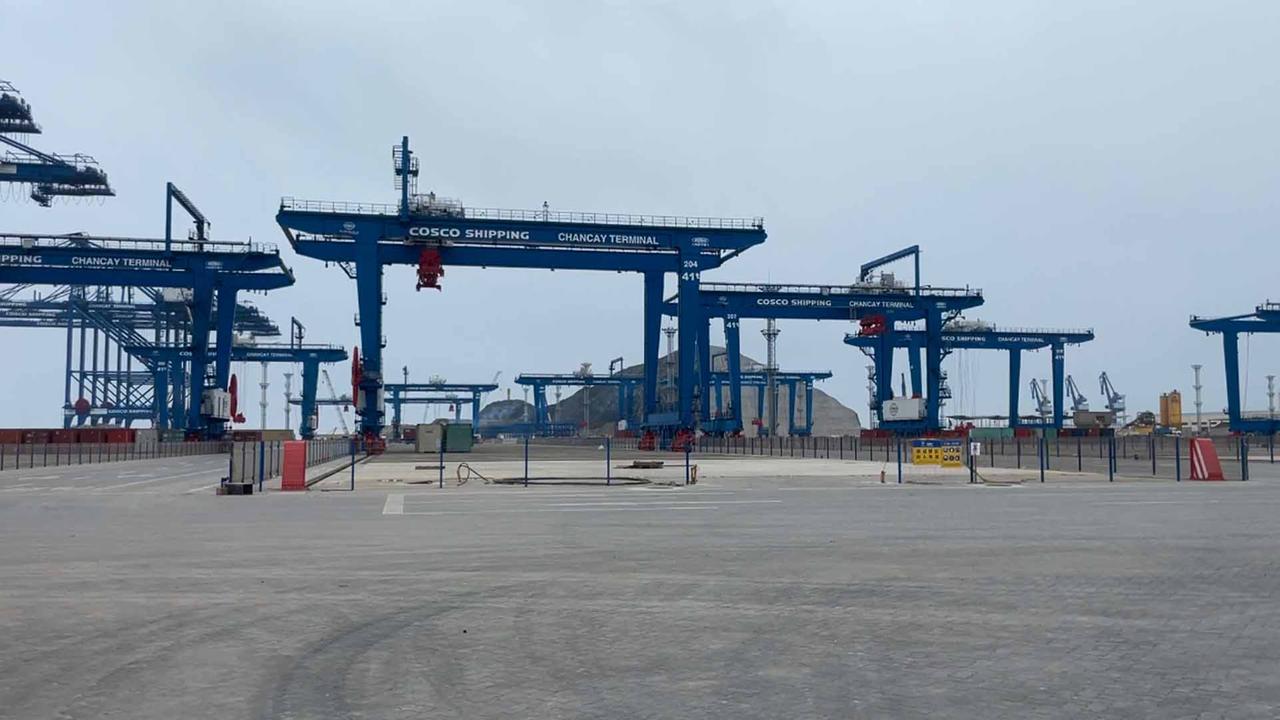world mirror
A megaport in Peru opens up new opportunities for China in South America. The Chancay facility will shorten the travel time of giant containers and could lead to more trade in sought-after raw materials. And also to political dependence?
The megaport of Chancay is the latest showcase of China's Silk Road initiative. The port is operated by the Chinese company Cosco Shipping Ports. In a few days, Peru's President Dina Boluarte and China's head of state Xi Jinping want to give the starting signal for the new cooperation in the capital Lima.
In Chancay, a small town between the desert and the sea, 75 kilometers from Lima, the 35,000 residents have previously made a living from fishing and an amusement park. On weekends, families travel to adventure between a plaster knight's castle, replicas of Big Ben and a Russian cathedral.
But the provincial tranquility is now over: “Our goal is to become the Singapore of Latin America,” says Transport Minister Raúl Pérez Reyes to journalists. There should be no way around Peru anymore.
“If someone from Brazil, Venezuela, Bolivia, Paraguay or Argentina wants to go to Asia, they will look at Peru as an exit port for Asia. That is our goal.”
Berth for the largest Container ships
When it comes to the port, it's all about superlatives. Special cranes tower over an area the size of 100 football fields. Operating almost fully automatically, the largest container ships with a capacity of up to 24,000 containers can dock and depart here.
The travel time to China is only 25 days, ten days faster than before. No more detours via other ports, which saves time and money.
Be part of the “party”.
Jorge Nuñez runs a small hotel with a sea view. Plastic flamingos adorn the courtyard, the interior could be from the 1970s, everything is sparkling clean. Chinese music plays from the speakers in the background.
Nuñez's hotel has been fully booked for months with engineers or programmers working at the port. A Sheraton hotel will soon be built, as will a Marriot. Nuñez wants to be on the winning side:
“It would be sad if we, the residents of Chancay, hosted a party that we didn't attend. Many opportunities will come, but few prepare for it.”
A boost for the whole country?
Mario de las Casas works for Cosco Shipping. For him, thanks to China, Peru is finally getting promoted to the league in which the Andean country belongs: the Champions League.
The country is rich in food, but also raw materials such as copper, silver and zinc. The people are hardworking, but politicians and bureaucrats are mostly incompetent and corrupt.
For a long time Peru looked to the Atlantic, now to the Pacific: “South America is always devalued: We're no good, we have no culture, we're like hillbillies, but it's not like that!”
High-tech industrial parks are to be built around the port, and the service industry is also to establish itself and bring jobs to the region. De las Casas goose-steps across the construction site, straight to the new tunnel that will connect the port with the Pan-American Highway: “This is majestic engineering.”
A triumph of engineering or a building with no regard for residents? The Chancay tunnel.
China is in charge at the port
For this tunnel, blasting took place right next to a residential area, almost next door to Miriam Arce's apartment. The first explosion woke her from her sleep. Would something like this be possible in Germany? she asks.
Cracks are showing on the walls of her house, and her neighbor's are even more noticeable. So this is respect for civil rights, and the Peruvian state is looking the other way. “I feel a lot of powerlessness, can't the Chinese president have some compassion for the citizens and the environment here, with everything that is being destroyed?”
Arce is part of a citizens' initiative to protect residents in Chancay and is calling for more transparency. Because the port is entirely in private hands and is therefore under Chinese control. When this became known, it caused a scandal. Suspicion of corruption was in the air.
Arce asks: How can it be that the Chinese company Cosco decides who docks and departs from the port and at what price, instead of the Peruvian state?
Access to resources and political action
In fact, China is the big winner in Peru, say analysts like Eric Farnsworth from the Council of the Americas business association. China is securing access to resource-rich South America, where it is usually the number one trading partner anyway.
The partnership also increases geopolitical power: “It is undoubted that China's involvement in developing countries means that it can also count on the support of its partners at UN meetings, for example. The USA and Europe must noticeably increase their commitment because China brings real benefits to South America.”
With the port, China also has a symbolic means of exerting pressure on the USA because Chinese naval ships could theoretically dock there, said Farnsworth: “This is a demonstration of power by Beijing in the Western Hemisphere that has never happened before.”
The first construction phase has now been completed, the second is already being planned. The test phase begins at the end of November: The container ships then travel from Chancay to Shanghai.
You can see these and other reports in Weltspiegel – on Sunday at 6:30 p.m. on Erste.





